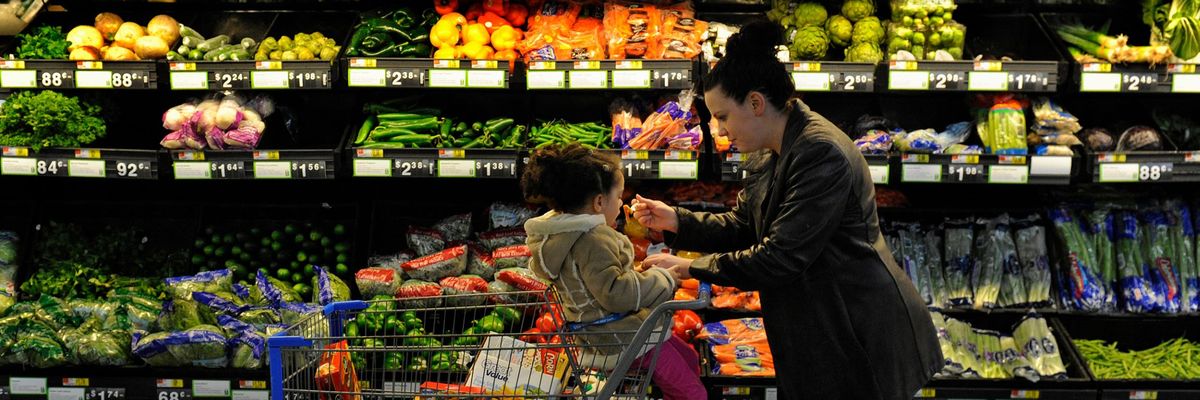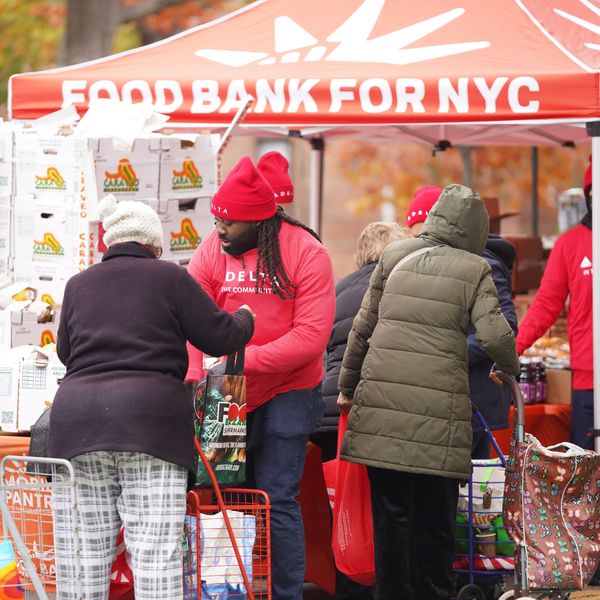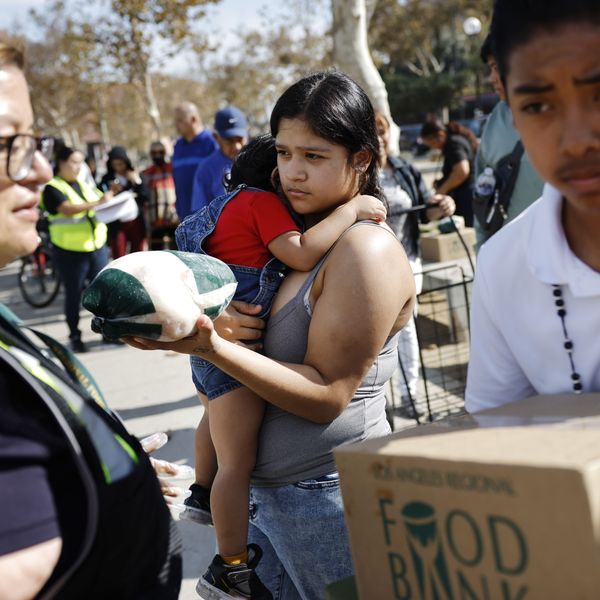
A mother offers a sample of pasta to her 3-year-old daughter at a grocery store on March 1, 2013 in Woonsocket, Rhode Island.
Lawmakers: Defend SNAP, Don’t Restrict it
Our government is morally obligated to protect the most vulnerable among us and prioritize access to essential resources like food assistance.
Raising my three grandchildren as a multigenerational caregiver, I expect the unexpected. Each day brings its own challenges, but nothing prepared me for the rollercoaster of navigating repeated attacks on the Supplemental Nutrition Assistance Program, or SNAP.
As a custodial grandmother in Washington, D.C., I rely on programs like SNAP to ensure my family not only survives but thrives. Yet, the constant threat of proposed cuts to essential food assistance services casts a shadow of fear and instability over our lives.
After months of stopgap funding, federal lawmakers finally reached a deal to prevent a government shutdown and ensure funding until September 30, 2024. However, this agreement offers no assurance that those who need SNAP the most won’t face eligibility and access hurdles. While the federal government determines SNAP funding, it's the states that control eligibility and oversee distribution to recipients. Now, in Kentucky, Maryland, Nebraska, and West Virginia, far-right Republicans are gunning to undermine their states’ ability to assist those who need it most: children and older adults.
I refuse to accept a future where politicians leave my grandchildren hungry because they lack the backbone to stand up for their constituents in their home districts and their neighbors—like me—in The District.
Although SNAP in D.C. remains unscathed, our Maryland neighbors may not be as fortunate. Rep. Andy Harris (R-Md.) has proposed legislation restricting which foods can be purchased with SNAP benefits in Maryland. Attacks like Harris’ disproportionately impact Maryland families who contribute to the DMV’s economy, culture, and community, constraining their choices simply because they reside in Maryland just a few miles north or east of my D.C. address.
Imagine the dire effects eligibility restrictions would pose if introduced in D.C., where 1 in 5 residents rely on SNAP to have food on the table. Without this vital assistance, I face difficult choices between purchasing essential medications that Medicaid won’t cover for my three grandchildren with disabilities and providing nourishment for our family. SNAP is pivotal in providing important nutrition for D.C. families, including mine. For us, SNAP is not merely a government program; it is a lifeline that ensures our basic necessities are met, allowing us to focus on providing love and care for our children. SNAP saves lives. Between 2014 and 2018, 9,000 children, on average, were lifted above the poverty line annually. I hope our lawmakers are acutely aware of the ethical implications of prioritizing politics over the well-being of vulnerable families.
To slash benefits for the 145,800 Washington, D.C. residents relying on SNAP, when the cost of living here is 53% higher than the national average and growing, is downright cruel. Despite being the U.S. capital’s workforce, we are victims of taxation without representation. We keep the city running day in and day out, yet without state power, politicians are content ignoring our struggles and treating us as if we’re invisible.
Organizations like SPACEs in Action and Community Change Action fight every day so voices like mine are heard. However, grassroots efforts alone cannot save the systematic support provided by federal programs like SNAP. It is incumbent upon lawmakers to prioritize the needs of D.C. families whenever there are budget negotiations and prevent further harm to vulnerable communities.
Our government is morally obligated to protect the most vulnerable among us and prioritize access to essential resources like food assistance. I refuse to accept a future where politicians leave my grandchildren hungry because they lack the backbone to stand up for their constituents in their home districts and their neighbors—like me—in The District. Pass the budget and stop the shutdown. Our families, communities, and nation’s livelihood depend on it.
An Urgent Message From Our Co-Founder
Dear Common Dreams reader, The U.S. is on a fast track to authoritarianism like nothing I've ever seen. Meanwhile, corporate news outlets are utterly capitulating to Trump, twisting their coverage to avoid drawing his ire while lining up to stuff cash in his pockets. That's why I believe that Common Dreams is doing the best and most consequential reporting that we've ever done. Our small but mighty team is a progressive reporting powerhouse, covering the news every day that the corporate media never will. Our mission has always been simple: To inform. To inspire. And to ignite change for the common good. Now here's the key piece that I want all our readers to understand: None of this would be possible without your financial support. That's not just some fundraising cliche. It's the absolute and literal truth. We don't accept corporate advertising and never will. We don't have a paywall because we don't think people should be blocked from critical news based on their ability to pay. Everything we do is funded by the donations of readers like you. Will you donate now to help power the nonprofit, independent reporting of Common Dreams? Thank you for being a vital member of our community. Together, we can keep independent journalism alive when it’s needed most. - Craig Brown, Co-founder |
Raising my three grandchildren as a multigenerational caregiver, I expect the unexpected. Each day brings its own challenges, but nothing prepared me for the rollercoaster of navigating repeated attacks on the Supplemental Nutrition Assistance Program, or SNAP.
As a custodial grandmother in Washington, D.C., I rely on programs like SNAP to ensure my family not only survives but thrives. Yet, the constant threat of proposed cuts to essential food assistance services casts a shadow of fear and instability over our lives.
After months of stopgap funding, federal lawmakers finally reached a deal to prevent a government shutdown and ensure funding until September 30, 2024. However, this agreement offers no assurance that those who need SNAP the most won’t face eligibility and access hurdles. While the federal government determines SNAP funding, it's the states that control eligibility and oversee distribution to recipients. Now, in Kentucky, Maryland, Nebraska, and West Virginia, far-right Republicans are gunning to undermine their states’ ability to assist those who need it most: children and older adults.
I refuse to accept a future where politicians leave my grandchildren hungry because they lack the backbone to stand up for their constituents in their home districts and their neighbors—like me—in The District.
Although SNAP in D.C. remains unscathed, our Maryland neighbors may not be as fortunate. Rep. Andy Harris (R-Md.) has proposed legislation restricting which foods can be purchased with SNAP benefits in Maryland. Attacks like Harris’ disproportionately impact Maryland families who contribute to the DMV’s economy, culture, and community, constraining their choices simply because they reside in Maryland just a few miles north or east of my D.C. address.
Imagine the dire effects eligibility restrictions would pose if introduced in D.C., where 1 in 5 residents rely on SNAP to have food on the table. Without this vital assistance, I face difficult choices between purchasing essential medications that Medicaid won’t cover for my three grandchildren with disabilities and providing nourishment for our family. SNAP is pivotal in providing important nutrition for D.C. families, including mine. For us, SNAP is not merely a government program; it is a lifeline that ensures our basic necessities are met, allowing us to focus on providing love and care for our children. SNAP saves lives. Between 2014 and 2018, 9,000 children, on average, were lifted above the poverty line annually. I hope our lawmakers are acutely aware of the ethical implications of prioritizing politics over the well-being of vulnerable families.
To slash benefits for the 145,800 Washington, D.C. residents relying on SNAP, when the cost of living here is 53% higher than the national average and growing, is downright cruel. Despite being the U.S. capital’s workforce, we are victims of taxation without representation. We keep the city running day in and day out, yet without state power, politicians are content ignoring our struggles and treating us as if we’re invisible.
Organizations like SPACEs in Action and Community Change Action fight every day so voices like mine are heard. However, grassroots efforts alone cannot save the systematic support provided by federal programs like SNAP. It is incumbent upon lawmakers to prioritize the needs of D.C. families whenever there are budget negotiations and prevent further harm to vulnerable communities.
Our government is morally obligated to protect the most vulnerable among us and prioritize access to essential resources like food assistance. I refuse to accept a future where politicians leave my grandchildren hungry because they lack the backbone to stand up for their constituents in their home districts and their neighbors—like me—in The District. Pass the budget and stop the shutdown. Our families, communities, and nation’s livelihood depend on it.
- 2 Million Children, Parents Set to Lose Food Aid Unless Congress Acts Now ›
- 'Absolutely Terrible Idea': Jayapal Warns Biden Against Accepting GOP Assault on Food Aid ›
- 'MAGA Economic Sabotage': 217 House Republicans Pass Debt Ceiling Bill With Harmful Cuts ›
- 'It's About Hurting the Poor': GOP Ramps Up Cruel Push for Work Requirements ›
Raising my three grandchildren as a multigenerational caregiver, I expect the unexpected. Each day brings its own challenges, but nothing prepared me for the rollercoaster of navigating repeated attacks on the Supplemental Nutrition Assistance Program, or SNAP.
As a custodial grandmother in Washington, D.C., I rely on programs like SNAP to ensure my family not only survives but thrives. Yet, the constant threat of proposed cuts to essential food assistance services casts a shadow of fear and instability over our lives.
After months of stopgap funding, federal lawmakers finally reached a deal to prevent a government shutdown and ensure funding until September 30, 2024. However, this agreement offers no assurance that those who need SNAP the most won’t face eligibility and access hurdles. While the federal government determines SNAP funding, it's the states that control eligibility and oversee distribution to recipients. Now, in Kentucky, Maryland, Nebraska, and West Virginia, far-right Republicans are gunning to undermine their states’ ability to assist those who need it most: children and older adults.
I refuse to accept a future where politicians leave my grandchildren hungry because they lack the backbone to stand up for their constituents in their home districts and their neighbors—like me—in The District.
Although SNAP in D.C. remains unscathed, our Maryland neighbors may not be as fortunate. Rep. Andy Harris (R-Md.) has proposed legislation restricting which foods can be purchased with SNAP benefits in Maryland. Attacks like Harris’ disproportionately impact Maryland families who contribute to the DMV’s economy, culture, and community, constraining their choices simply because they reside in Maryland just a few miles north or east of my D.C. address.
Imagine the dire effects eligibility restrictions would pose if introduced in D.C., where 1 in 5 residents rely on SNAP to have food on the table. Without this vital assistance, I face difficult choices between purchasing essential medications that Medicaid won’t cover for my three grandchildren with disabilities and providing nourishment for our family. SNAP is pivotal in providing important nutrition for D.C. families, including mine. For us, SNAP is not merely a government program; it is a lifeline that ensures our basic necessities are met, allowing us to focus on providing love and care for our children. SNAP saves lives. Between 2014 and 2018, 9,000 children, on average, were lifted above the poverty line annually. I hope our lawmakers are acutely aware of the ethical implications of prioritizing politics over the well-being of vulnerable families.
To slash benefits for the 145,800 Washington, D.C. residents relying on SNAP, when the cost of living here is 53% higher than the national average and growing, is downright cruel. Despite being the U.S. capital’s workforce, we are victims of taxation without representation. We keep the city running day in and day out, yet without state power, politicians are content ignoring our struggles and treating us as if we’re invisible.
Organizations like SPACEs in Action and Community Change Action fight every day so voices like mine are heard. However, grassroots efforts alone cannot save the systematic support provided by federal programs like SNAP. It is incumbent upon lawmakers to prioritize the needs of D.C. families whenever there are budget negotiations and prevent further harm to vulnerable communities.
Our government is morally obligated to protect the most vulnerable among us and prioritize access to essential resources like food assistance. I refuse to accept a future where politicians leave my grandchildren hungry because they lack the backbone to stand up for their constituents in their home districts and their neighbors—like me—in The District. Pass the budget and stop the shutdown. Our families, communities, and nation’s livelihood depend on it.
- 2 Million Children, Parents Set to Lose Food Aid Unless Congress Acts Now ›
- 'Absolutely Terrible Idea': Jayapal Warns Biden Against Accepting GOP Assault on Food Aid ›
- 'MAGA Economic Sabotage': 217 House Republicans Pass Debt Ceiling Bill With Harmful Cuts ›
- 'It's About Hurting the Poor': GOP Ramps Up Cruel Push for Work Requirements ›

